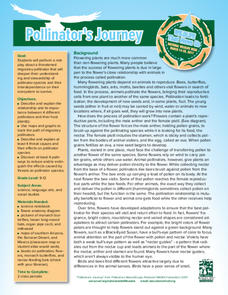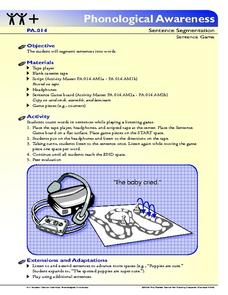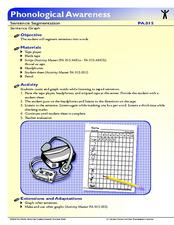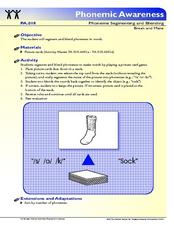Curated OER
Exploring Pentatonic Scales
What better way to teach pentatonic scales than to have them playing while you define them? This slide-show includes simple yet correct descriptions of five note scales in C, G, and F major as well as examples for learners to hear.
Curated OER
Music: The Circus
Introduce youngsters to the purposeful way in which they can use music. After listening to a circus song and view circus pictures, they hear sounds that introduce, create suspense, and set a tone. This is a good introduction for younger...
Curated OER
History of Ponce de Leon in Florida
Based in sound Educational Theory, this lesson uses art to convey the story of Ponce de Leon. Mild to moderately disabled middle schoolers hear the story of the Fountain of Youth, examine a paining of Ponce de Leon, and act out a scene...
Curated OER
Caves - How Would it Feel to Live in a Cave?
Some phenomenal photographs appear in this short presentation on underground caves. Each slide has a photograph, accompanied by a thought-provoking question, such as: "What sounds do you hear?" and, "What would it feel like to live...
Curated OER
Story switch up
Gather your class around to hear the real story of Jack and the Bean Stalk. In this version Jack is mean and rude, and the Giant is friendly and kind. Have your class rewrite a classic fairy tale to build strong written communication...
Curated OER
Standard English
Double negatives are a no-no in the English language, yet you hear people using them all the time. "I ain't got no pencils," is a classic example. This presentation addresses double negatives, and teaches learners how to avoid this...
National Wildlife Federation
Pollinator's Journey: Grades 9-12
Gain a deeper understanding of migratory pollinators. After studying about pollinators and their effects on flowering plants, learners hear a story about the migration of Monarch butterflies and bats in the Sonoma Desert. Small groups...
Curated OER
Because of Winn-Dixie
Readers analyze an excerpt from Kate DiCamillo's novel Because of Winn-Dixie. They read silently, and then hear it read aloud. Definitions for underlined vocabulary words are in the margin, and other potentially difficult words are in...
Florida Center for Reading Research
Phonics: Letter-Sound Correspondence, Letter-Sound Match
Boost initial, medial, and final sound correspondence. Scholars practice decomposing word sounds using image cards and a worksheet. Learners cut out 10 three-letter images, sound them out, and glue them on the worksheet. Each word is...
Florida Center for Reading Research
Phonological Awareness: Syllables, Syllable Say
Counting syllables can be fun when it's done with a friend. In pairs, learners say words as their partner counts the syllables they hear.
Florida Center for Reading Research
Sentence Game
How many words do you hear? As you introduce the way sentences are made up of words, this listening game offers an excellent independent practice opportunity. Kids take turns with a partner as they listen to a sentence twice, counting...
Florida Center for Reading Research
Phonological Awareness: Sentence Segmentation, Sentence Graph
Young scholars segment sentences while they listen to a series of sentences. Using a graph, pupils make a mark for each word they hear. Learners listen to each sentence three times; once to listen, once to mark, and once to check their...
Florida Center for Reading Research
Sound it-Bag it
Scholars sort picture cards based on the initial phoneme they hear as they say the name of each image. They pick a card, say its name, then place it in one of five bags based on how its initial phoneme matches the initial phoneme...
Florida Center for Reading Research
Phonological Awareness: Phoneme Blending, What's My Word?
At a listening station, learners listen to a pre-recorded script; they follow the directions and number each picture on their picture chart corresponding to the segmented phonemes they hear.
Florida Center for Reading Research
Phonological Awareness: Phoneme Isolating, Final Phoneme Find
This phonics activity engages listening skills and concentration. Young scholars listen to a teacher-made recording and use the provided worksheet to number the final phonemes they hear.
Florida Center for Reading Research
Phonemic Awareness: Phoneme Segmenting and Blending, Break and Make
Young learners build phonemic awareness and strong phoneme blending skills. Pairs guess the image on the card based on the word segment sounds given by blending what they hear.
Curated OER
The Little Red Hen: Lesson
After hearing the classic version of The Little Red Hen, pre-schoolers use the sequence of events and ordinal position words to construct a version of their own. They use stick puppets to retell the story, with updated modifications that...
Curated OER
Using a Dictionary
What can we find in a dictionary? Your scholars may be surprised to hear that it's more than just definitions. They explore this resource by finding word meanings, uses, and origins in this vocabulary learning exercise. Learners look up...
Curated OER
Yo Uso Mis Cinco Sentidos para: oír, probar, tocar, ver, oler
What can you hear right now? What can you smell? Designed to be used with young Spanish language learners, this packet reinforces vocabulary relating to the five senses. Bring in snacks to have language learners decide which snacks are...
Curated OER
Phoneme Substitution (With Letters)
Get pre-readers comfortable with phoneme substitution using these helpful letter cards, which are printable in three different sizes depending on your classroom needs. Once scholars understand some letter sounds, they can begin...
Curated OER
Introduce: Cause and Effect
Introduce beginning readers to cause and effect in a story by exploring it together. Learners make predictions about a book based on its cover, title, and a brief flip through the pages. They listen to an explanation of cause and effect...
Shakespeare in American Life
"We Few, We Happy Few": Motivational Speech in Henry V
Class members may "think themselves accurs'd" when they first hear of an assignment that asks them to create a motivational speech. After studying the Saint Crispin's Day speech from Shakespeare's Henry V; however, they will count...
Southern Nevada Regional Professional Development Program
Poetry Aloud/Poetry Out Loud
To appreciate the value of seeing and hearing a poetry performance, groups prepare readings of selected poems and then compare and critique their interpretations and videotaped versions of the same poem. Included in the resource are...
Curated OER
Attitude and Interest Survey
Are you about to launch into one of William Shakespeare's plays or a collection of his sonnets? If you doubt your class has read much Shakespeare, have them complete this attitude and interest survey. A lot of preconceived notions swirl...
Other popular searches
- Hearing Impaired
- Sense of Hearing
- Hearing Impaired Deaf
- Sound and Hearing
- Hearing Loss
- Budget Hearing
- Sound, Hearing
- Hearing Impairment
- Hearing Range
- Hearing Impaired Reading
- For Hearing Impaired
- Free Hearing Impaired

























